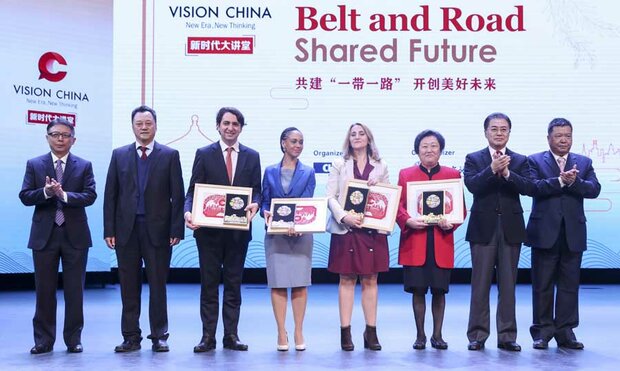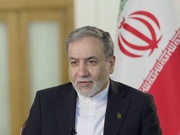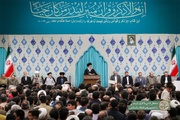During the event, four speakers, from China and abroad, shared their opinions on high-quality development under the Belt and Road Initiative (BRI). They also explored how and why the initiative is nudging global governance toward fairness, inclusivity, mutual benefit, and multilateralism.
Weng Jieming, vice-chairman of the State-owned Assets Supervision and Administration Commission of the State Council, said in the opening remarks that China's State-owned enterprises have actively participated in BRI over the past six years, yielding impressive results in infrastructure connectivity.
"For further development, the State-owned enterprises will continue to focus on better outcomes under the BRI, by abiding by the values of human progress and providing service with integrity during project constructions," Weng said. He also called for more university students, who formed the majority of the Vision China audience, to participate in BRI projects in their future careers.
Vision China's sixth edition brought together international think tanks, policymakers, trade professionals, as well as university students. The event aimed to tell the stories of BRI from multiple perspectives and in a wider global context.
The event aligned with the second Belt and Road Forum (BRF) for International Cooperation, which was held from Thursday to Saturday. The three-day event convened nearly 40 heads of state or government, along with about 5,000 participants from more than 150 countries and 90 international organizations.
Addressing nearly 1,000 attendees at Vision China, Zhao Jianguo, director general of the International Communication Bureau of Publicity Department of the CPC Central Committee, said President Xi Jinping's keynote speech at the second Belt and Road forum showed China's determination and pragmatism in further deepening reform and opening-up in the new era.
Zhao shared three points on BRI cooperation. First, BRI needs to build consensus while upholding the spirit of extensive consultation, joint contributions, and shared benefits. Second, it needs to involve think tanks from around the globe, which have already been driving forces for the initiative. Third, it needs a youthful injection of will and spirit.
"Today's Vision China talks are being held to celebrate the second Belt and Road Forum for International Cooperation held in Beijing over the past two days," said Zhou Shuchun, publisher and editor-in-chief of China Daily.
"We trust that with the strengthening of effective cooperation under the Belt and Road Initiative, China will provide new opportunities and serve as a powerful driving force for global development in the new era. And we trust that today's talks will help create consensus on the B&R Initiative as part of the efforts to build a global community of a shared future," Zhou added.
The BRI plays an important role in the practice of building a community of shared future for mankind, said guest speaker Zhao Baige, chairperson of the Advisory Committee of the Belt and Road International Think Tank at the Chinese Academy of Social Sciences.
Zhao said the world is changing significantly in the current Fourth Industrial Revolution's wave. The change is happening parallel with the evolution of a new form of globalization, in which the Belt and Road plays an important role driving the process, said Zhao.
For further high-quality, sustainable development of BRI, Zhao proposed three suggestions: respecting laws and regulations; taking a people-centered approach; ensuring BRI projects' fiscal sustainability.
The idea of joining BRI was well received in Serbia, said Ivona Ladjevac, head of the center for the Belt & Road at the Institute of International Politics and Economics in Belgrade, adding that the initiative is an "open, inclusive platform for development".
Ladjevac delivered a speech on the mutually beneficial relationship between BRI and cooperation between China and Central and Eastern European Countries. "These frameworks will further enhance China-EU cooperation in a wide range of areas," she added.
The Serbian academic rejected what she called baseless accusations that BRI intends to undermine the global economic order. She stressed that BRI provides an opportunity to "offer some solutions for the world economy affected by current economic crisis".
Ladjevac was joined by speakers Hannah Ryder, Development Reimagined CEO and former United Nations Development Programme policy and partnerships head, and Andreas Pierotic, trade commissioner of Embassy of Chile in China.
They both provided insights into the BRI, ranging from mechanisms for third-party cooperation to Latin America's opportunities in the new form of global economy in the 21st century.
Ryder spoke highly of BRI's new move to encourage the third-party market cooperation, or trilateral cooperation, as the multilateral partnership mechanism is designed to "help countries take up better loans" and is "truly objective".
In addition, the trilateral cooperation scheme will have the prospect of driving a "sustainable industrialization and investment" program, according to Ryder, as it actively works with buyers as well as factories to shift global supply chains and attract investors that share this future, positive vision.
Pierotic explained why Chile, a Latin American country far away from China's ancient silk road, is embracing the BRI.
BRI will become the "main pillar between China and the Latin America region", said Pierotic, adding that it will not only improve unimpeded trade, but also boost the finance connectivity, logistics connectivity, people-to-people connectivity.
Ni Haidong, Party chief of Beijing Language and Culture University, also attended the event.
The event ended with enthusiastic applause, having turned out to be a timely platform for attendees to exchange ideas on the outcomes of BRF, which concluded the same day. The talks were broadcast live on China Daily's website and app, as well as China Daily's Sina Weibo, Tencent Video, Toutiao, Bilibili, Facebook and Twitter accounts.
Vision China was established January 2018. By inviting well-known political, business and academic speakers to tell China's story from global perspectives and discuss major global topics, it aims to become a broad platform to ensure China's voice is better heard in the new era as well as to build a new channel for responding to global concerns on hot China-related issues through profound debate.
What they say
I think the Belt and Road Initiative can help improve connectivity between countries and facilitate international trade. It can also provide business opportunities for these countries. I think students majoring in international trade will be very interested in getting more knowledge about the plan.
Dilbar Hussain, freshman majoring in international trade at Beijing Language and Culture University
From today's Vision China, I am proud to learn that my country, Chile, is part of the Belt and Road Initiative. I think more countries from Latin America should join the initiative as we see real changes taking place because of it. I think the BRI makes greater integration, greater globalization and more dialogue possible and is good for Latin America.
Roxanna Serrano, hotel services team leader at Antarctic Logistics & Expeditions
The Belt and Road Initiative has empowered small businesses and less-developed countries with fair opportunities to develop. And what's more important, the initiative is not only about building infrastructure and corridors for trading goods but also about exchanging thoughts and ideas. It's not simply a one-way output from China. It's a mutual exchange in which China can learn from other cultures as well.
Tim Clancy, founder and CEO of Tim Studio, a company dedicated to promoting Sino-Australian cultural exchanges
One of the reasons I studied Chinese is that almost everybody in my country is attracted to China's fast development, and we want to learn from its experience. The Belt and Road Initiative obviously has brought Tunisia and China closer, but it also explains what a Chinese Dream would be like-sharing, cooperation and common prosperity.
Ben Khalifa Fadwa, master's degree student from Tunisia at Beijing Language and Culture University, majoring in teaching Chinese to speakers of other languages
My working experience in Africa has shown me essential features of the BRI. It is not only about simply building factories or infrastructure in the local areas, but more important, many local residents can learn new skills through participating in the project. The initiative has enhanced mutual understanding and built trust, eliminating stereotypes of each other.
Bu Hechun, partner at Shannon.AI, a Beijing startup in artificial intelligence
MNA/China Daily

























Your Comment